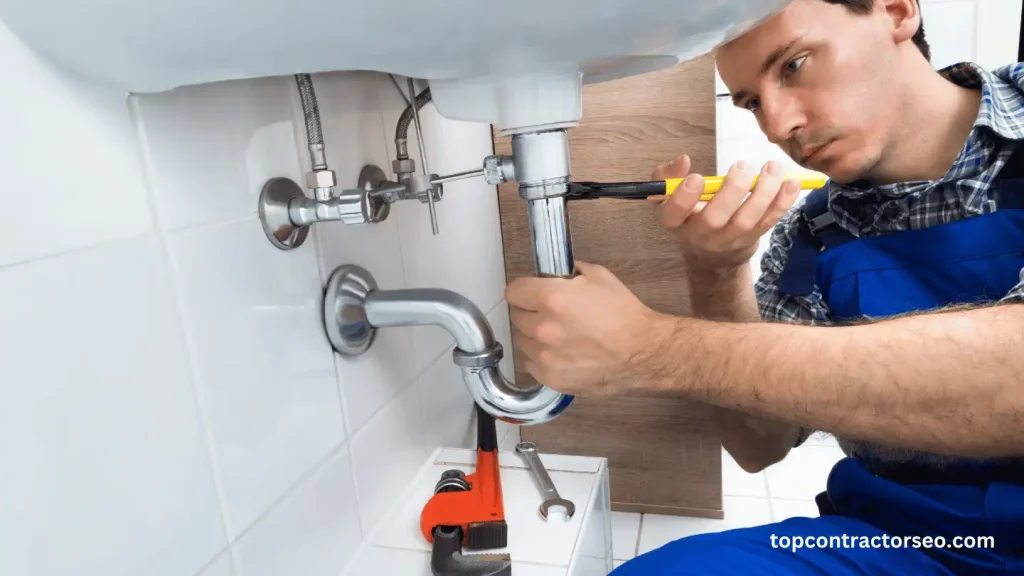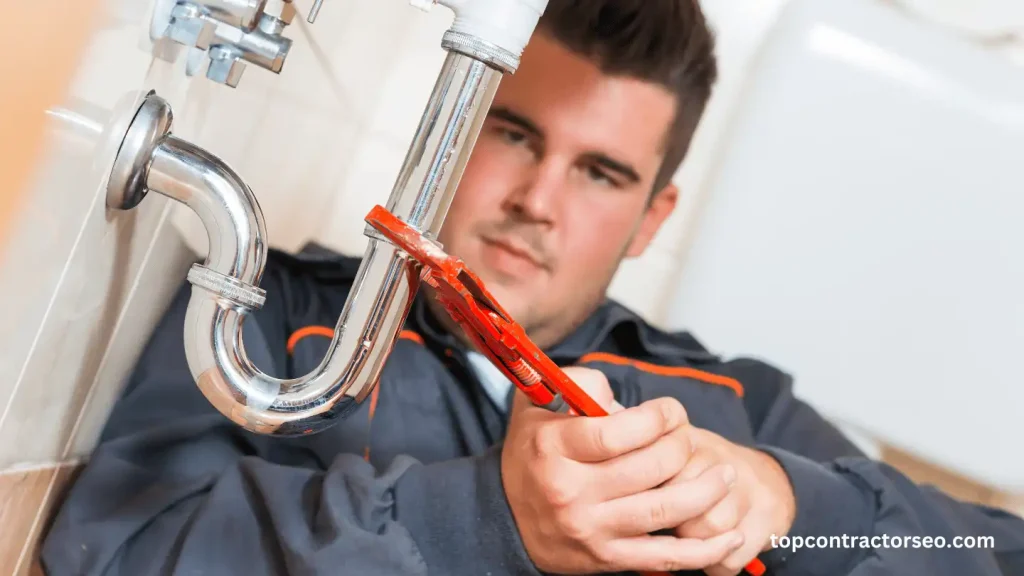SEO For Plumbers – A Definitive Guide
Staying updated with the latest search engine optimization practices is essential for success in the plumbing industry. SEO for plumbers involves optimizing your website and online presence to enhance your visibility on search engine results pages. This makes it easier for potential clients to find your services when they need them.
Implementing effective SEO strategies—from thorough keyword research to fine-tuning on-page optimization—is crucial in improving your search engine rankings. Each of these elements significantly drives more traffic to your website and ultimately expands your client base.

What Is Plumber SEO?
Plumber SEO is optimizing a plumbing business’s online presence to improve visibility in search engine results. It aims to attract more potential customers searching for online plumbing services.
Every month, hundreds of thousands of people search for plumbing services online. Effective SEO helps you capture this traffic and turn it into leads for your business.
Plumber SEO is an ongoing process that requires regular updates and monitoring to maintain and improve your search engine rankings.
Why Plumbers Need SEO
SEO is crucial in helping plumbers establish a solid online presence and attract more customers. It enhances local visibility, generates quality leads, and enables smaller plumbing businesses to compete effectively with larger companies.
Key Components Of SEO For Plumbers
Effective SEO for plumbers involves several crucial elements that boost your online visibility. These components help your website rank higher in search results and attract more potential customers.
- On-Page SEO
- Off-Page SEO
- Local SEO
- Technical SEO

Keyword Research For Plumbers
Keyword research is crucial for plumbers to improve online visibility and attract more customers. By identifying the right keywords, you can optimize your website content and target high-intent searches that lead to more conversions.
How To Find The Right Keywords
- Start by brainstorming a list of plumbing services you offer.
- Use keyword research tools like Google Keyword Planner or Ahrefs to expand your list and find related terms.
- Look for keywords with decent search volume and manageable keyword difficulty.
- Consider local search intent by adding location-specific terms to your keywords, such as “emergency plumber in [your city]” or “[your city] water heater repair.”
- Analyze your competitors’ websites to see which keywords they’re targeting. This can help you identify gaps in your strategy and discover new opportunities.
High-Intent Keywords For Plumbing Services
Focus on service keywords that indicate a strong intention to hire a plumber. These often include:
- Emergency plumbing services
- Water heater repair/installation
- Pipe leak detection
- Drain cleaning
- Sewer line repair
To target specific customer needs, include modifiers like “24/7,” “licensed,” or “affordable.”
Consider creating separate landing pages for each high-intent service keyword to improve your chances of ranking.
Long-Tail Keywords
Long-tail keywords are longer, more specific phrases that typically have lower search volume but higher conversion rates. They often reflect a user’s specific problem or question.
Examples of plumbing long-tail keywords:
- “How to fix a leaky faucet without calling a plumber.”
- “Cost to replace a water heater in [your city].”
- “Signs of a clogged sewer line”
Create content that addresses these specific queries to attract potential customers at different stages of the buying journey.
Use question keywords in your FAQ section or blog posts to provide valuable information and establish your expertise.

Optimizing A Plumbing Website For SEO
Effective plumbing website optimization requires a strategic approach to structure, content, mobile-friendliness, and multimedia elements. Focusing on these key areas can improve your site’s visibility and attract potential customers.
Website Structure And URL Optimization
- Start by creating a logical website structure that’s easy for users and search engines to navigate.
- Use descriptive, keyword-rich URLs for each page. For example, use “yourplumbing.com/services/drain-cleaning” instead of “yourplumbing.com/page1”.
- Implement a clear hierarchy with your primary services as top-level pages.
- Use header tags (H1, H2, H3) to organize content on each page. Your H1 should include your primary keyword, while H2s and H3s can target related terms.
- Create a sitemap to help search engines index your pages more effectively.
- Pay attention to your internal linking strategy, connecting related service pages to help users and search engines understand your site’s structure.
Content Optimization For Plumbing Services
- Develop high-quality, optimized content for each of your plumbing services.
- Focus on creating informative, engaging pages that answer common customer questions and showcase your expertise.
- Optimize your page titles and meta descriptions with relevant keywords.
- For example, a drain cleaning page might have the title tag “Expert Drain Cleaning Services in [Your City] | [Your Company Name].”
- Include location-specific information to boost your local SEO efforts. If you operate in multiple locations, create separate pages for different service areas.
- Use a mix of text, images, and videos to make your content more engaging. Include customer testimonials and case studies to build trust and credibility.
Mobile Optimization
With more users searching on mobile devices, ensure your plumbing website is fully responsive.
- Test your site on various devices and screen sizes to guarantee a smooth user experience.
- Improve your site’s loading speed by compressing images, minifying code, and leveraging browser caching.
- A fast-loading site improves user experience and positively impacts your search rankings.
- Make sure your contact information is easily accessible on mobile devices.
- Include click-to-call buttons and a mobile-friendly contact form to make it simple for potential customers to reach you.
Image And Video SEO For Plumbers
- Optimize your images by using descriptive, keyword-rich file names and alt text. For example, use “drain-cleaning-service-atlanta.jpg” instead of “IMG001.jpg”.
- Compress your images to reduce file sizes without sacrificing quality. This helps improve page loading speed, which is crucial for user experience and SEO.
- When using videos, host them on platforms like YouTube and embed them on your site. Create descriptive titles and descriptions for your videos, including relevant keywords.
- Consider adding transcripts or captions to your videos. This will improve accessibility and provide additional text content for search engines to index.
Local SEO For Plumbing Contractors
Local SEO is crucial for plumbing businesses to attract nearby customers. Optimizing your online presence for local searches can significantly boost your visibility and customer base.
Optimize Your Google Business Profile
Google Business Profile (formerly Google My Business) is essential for local SEO success. It allows you to manage your online presence across Google, including Search and Maps.
To optimize your profile:
- Ensure your business name, address, and phone number are accurate
- Add high-quality photos of your team and work
- List your services and service areas
- Respond promptly to customer reviews and questions
A well-optimized Google Business Profile can help you appear in the local pack, increasing your chances of being found by potential customers.
How To Get More Reviews
Reviews play a crucial role in local SEO and customer trust. To get more reviews:
- Ask satisfied customers to leave reviews after completing a job
- Send follow-up emails with links to your review platforms
- Respond to all reviews, both positive and negative
- Showcase positive reviews on your website and social media
Encouraging reviews can improve your local search rankings and attract more customers. Positive reviews build trust and credibility, while responding to negative reviews shows your commitment to customer satisfaction.
Optimizing For ‘Near Me’ Searches
To rank for “plumber near me” searches:
- Include location-based keywords in your website content and meta tags
- Create location-specific pages for each area you serve
- Ensure your NAP citations (Name, Address, Phone) are consistent across all online directories
- Use schema markup to help search engines understand your business location
Optimizing for “near me” searches helps you appear in local results when potential customers need your services urgently. This can lead to more calls and bookings from your target area.
Directory Listings
Directory listings are essential for plumbers looking to improve their local SEO. Plumbers can enhance their visibility in local search results by getting listed on reputable online directories like Yelp, Angie’s List, and Google Business Profile. These listings help search engines verify a business’s legitimacy, increasing the chances of appearing in relevant searches. Consistent and accurate information across directories, such as name, address, and phone number (NAP), also boosts credibility and trust with potential clients.
Technical SEO For Plumbers
Technical SEO forms the foundation of your plumbing website’s performance in search results. By focusing on site speed, implementing proper schema markup, and ensuring mobile usability, you can significantly enhance your online visibility and user experience.
Importance Of Site Speed
Site speed is crucial for your plumbing website’s success. A fast-loading site improves user experience and boosts your search engine rankings. To optimize your site speed:
- Compress images without sacrificing quality
- Minify CSS, JavaScript, and HTML files
- Leverage browser caching
- Use a content delivery network (CDN)
Consider using Google’s PageSpeed Insights tool to analyze your site’s performance. It provides specific recommendations to improve loading times. Remember, every second counts – a one-second delay can lead to a 7% reduction in conversions.
Schema Markup For Plumbing Services
Implementing schema markup helps search engines better understand your plumbing services. This structured data can lead to rich snippets in search results, increasing your visibility and click-through rates.
Key schema types for plumbers include:
- LocalBusiness
- Service
- Review
Use schema to highlight your business hours, service areas, and customer reviews. This technical SEO strategy can give you an edge over competitors who haven’t implemented structured data.

Voice Search Optimization For Plumbers
Voice search is transforming how potential customers find plumbing services. Adapting your SEO strategy to accommodate this trend can significantly boost your online visibility and attract more clients.
Optimizing For Voice Search
- To optimize for voice search, focus on natural language and conversational keywords. Use long-tail phrases that people are likely to speak, such as “How do I fix a leaky faucet?” or “Where’s the nearest emergency plumber?”
- Create FAQ pages addressing common plumbing issues. These pages can directly answer voice queries and improve your chances of appearing in featured snippets.
- Ensure your website is mobile-friendly and loads quickly. Voice searches often happen on mobile devices, so a responsive design is crucial.
- Local SEO is vital for voice search success. Keep your Google Business Profile up-to-date with accurate information about your services, hours, and location.
- Use schema markup to help search engines understand your content better. This can increase your chances of appearing in voice search results.
- Consider creating how-to guides and instructional content. Many voice queries require step-by-step instructions, which you can provide for simple plumbing tasks.
Link Building Strategies For Plumbers
Link building is crucial for improving your plumbing website’s search engine rankings and driving more traffic. Effective strategies include leveraging local directories, guest posting, and acquiring quality backlinks from relevant sources.
How To Get Backlinks For Plumbing Services
- To acquire quality backlinks, start by creating link-worthy content on your website. Develop comprehensive guides, infographics, or video tutorials on plumbing topics that others will want to reference.
- Contact local suppliers, hardware stores, or complementary businesses (e.g., electricians and HVAC companies) to explore partnership opportunities. These can lead to mutual linking arrangements.
- Consider sponsoring local events or charities. Many organizations will link to sponsors on their websites, providing you with valuable backlinks and community goodwill.
- Engage in online forums and Q&A sites related to plumbing. Provide helpful answers and include a link to your website when relevant, but avoid spamming.
Local Directories
- Local directories are valuable for building backlinks to your plumbing website. Start by claiming your Google Business Profile and optimizing it with accurate information. List your business on popular directories like Yelp, Yellow Pages, and Angi.
- Seek out industry-specific directories such as PlumbingWeb and PHCC (Plumbing-Heating-Cooling Contractors Association). These targeted listings can boost your local SEO efforts.
- Don’t forget about chamber of commerce websites and local business associations. These often provide backlink opportunities and can enhance your local visibility.
Guest Posting Opportunities
- Guest blogging is an excellent way to build quality backlinks and establish expertise. Identify relevant home improvement, DIY, or local news websites that accept guest posts.
- Craft informative articles on plumbing topics such as water conservation, common household plumbing issues, or maintenance tips. Ensure your content provides value to the host site’s audience.
- Include a brief author bio with a link to your website. This will build a backlink and help create brand mentions and authority in your field.
Tracking And Measuring SEO Success
Effective SEO requires ongoing monitoring and analysis. By tracking key metrics and using the right tools, you can measure your plumbing website’s performance and make data-driven improvements.
Tools For Tracking SEO Performance
- Google Analytics is essential for tracking your website’s traffic and user behavior. Set up your account to monitor visitor sources, page views, and conversion rates.
- Google Search Console provides valuable insights into your site’s search performance. Use it to track your target keywords’ impressions, clicks, and average positions.
- Third-party SEO tools like Ahrefs or SEMrush can help you monitor backlinks, keyword rankings, and competitor performance. These tools offer comprehensive data to inform your SEO strategy.
- Consider using heat mapping tools like the FREE Microsoft Clarity to visualize how users interact with your pages. This can help you optimize content placement and improve user experience.
Key Metrics To Monitor
Track your organic traffic growth over time. This indicates how well your SEO efforts are attracting potential customers.
- Monitor your keyword rankings for important plumbing-related terms. Focus on local keywords that potential customers in your area will likely use.
- Pay attention to your click-through rate (CTR) in search results. A low CTR may indicate that your meta titles and descriptions need improvement.
- Measure your website’s bounce rate and average session duration. These metrics can reveal whether your content is effectively engaging visitors.
- Track conversion rates for key actions like contact form submissions or phone calls. This helps you assess how well your SEO efforts translate into business results.
- Monitor your website’s load speed regularly. Faster sites tend to rank better and provide a better user experience.
Content Marketing For Plumbers
Content marketing helps plumbers attract and engage potential customers through valuable information. It builds trust and positions you as an industry expert.
Creating Service-Based Content
- Focus on crafting content around your plumbing services. Create detailed pages for each service you offer, explaining the process, benefits, and when customers might need it. For example, write about water heater installation, pipe repair, or drain cleaning.
- Include frequently asked questions to address common concerns. Use clear, concise language to explain technical concepts. Add high-quality images or diagrams to illustrate your points.
- Consider creating comparison guides between different plumbing solutions. This helps customers make informed decisions and showcases your expertise.
Developing How-To And DIY Guides
- Produce guides that empower homeowners to handle minor plumbing issues. Topics could include unclogging drains, fixing leaky faucets, or maintaining water heaters.
- Break down each task into simple, actionable steps. Use numbered lists for clarity. Include safety warnings and when to call a professional.
- Create video tutorials to complement written guides. This will appeal to visual learners and boost engagement on your website and social media channels.
Plumbing Case Studies And Success Stories
- Share real-life examples of challenging plumbing problems you’ve solved. Describe the issue, your approach, and the positive outcome for the customer.
- Use before-and-after photos to demonstrate your work visually. Include specific details, such as time saved or money saved for the client.
- Highlight any unique or innovative solutions you’ve implemented. This will showcase your problem-solving skills and set you apart from competitors.
- Consider creating infographics to summarize key points from your case studies. These can be easily shared on social media and can help attract new customers.
Common SEO Mistakes For Plumbers
Avoiding certain pitfalls can significantly improve your plumbing website’s search engine performance. Addressing these common errors will enhance your online visibility and attract more potential customers.
Overlooking Local SEO
- Local SEO is crucial for plumbers targeting specific geographic areas. Many plumbers fail to claim their Google Business Profile, which is a free and essential tool for local search visibility.
- Neglecting to optimize your profile with accurate business information, service areas, and customer reviews can hinder your local search rankings.
- Another mistake is not including location-specific keywords in your website content. Phrases like “plumber in [Your City]” or “24-hour plumbing service in [Your Neighborhood]” help search engines understand your service area.
- Ignoring local business directories and citation sites is also a missed opportunity. These listings, known as NAP (Name, Address, Phone) citations, play a role in local search rankings.
Ignoring Website Speed
Slow-loading websites frustrate users and negatively impact search rankings. Many plumbing websites suffer from large, unoptimized images, excessive plugins, or outdated coding practices that slow down page load times.
Google considers page speed as a ranking factor, especially for mobile searches. Failing to optimize your site for mobile devices is a critical mistake, as many potential customers search for plumbing services on their smartphones.
To improve website speed:
- Compress and optimize images
- Minimize HTTP requests
- Enable browser caching
- Use a content delivery network (CDN)
Regularly test your website’s speed using tools like Google PageSpeed Insights and make necessary improvements.
Using Outdated SEO Practices
SEO techniques evolve constantly, and using outdated methods can harm your rankings. For example, keyword stuffing, an old tactic of overusing keywords in content, can now lead to penalties from search engines.
Another common mistake is neglecting to create high-quality, informative content. Search engines prefer websites that offer valuable information to users. Focus on creating helpful guides, how-to articles, and FAQs related to plumbing services.
Ignoring the importance of backlinks from reputable websites is also detrimental. Quality backlinks signal trust and authority to search engines. However, avoid purchasing links or participating in link schemes, as these violate search engine guidelines.
Failing to track and analyze your SEO efforts is a missed opportunity for improvement. Use tools like Google Analytics and Google Search Console to monitor your website’s performance and make data-driven decisions.
SEO For Plumbing E-Commerce
E-commerce SEO for plumbing businesses requires specialized strategies to target online shoppers and boost visibility. Effective techniques include optimizing product pages, creating educational content, and adapting to seasonal trends.
Optimizing Plumbing Supply Or Product Pages
To improve your plumbing e-commerce SEO, focus on optimizing product pages. Use descriptive, keyword-rich titles for each item. Include detailed product descriptions that highlight features, specifications, and benefits.
Add high-quality images and videos to showcase your products. Implement schema markup to help search engines understand your product information better.
Create unique content for each product page to avoid duplicate content issues. Include customer reviews and ratings to build trust and provide fresh content.
Optimize your URL structure by including relevant keywords. For example:
- yourdomain.com/category/product-name
- yourdomain.com/plumbing-supplies/copper-pipe-fittings
SEO For Online Plumbing Courses
- If you offer online plumbing courses, tailor your SEO strategy to attract potential students. Create informative course descriptions that include relevant keywords and highlight the benefits of your training.
- Develop a content marketing strategy focused on plumbing education. Write blog posts, create videos and share tips related to your course topics. This can help establish your expertise and attract organic traffic.
- Optimize your course landing pages with clear calls to action and relevant keywords. To build credibility, include testimonials from past students.
- Consider creating a FAQ section addressing common questions about your courses. This can help improve your search rankings for long-tail keywords and provide valuable information to potential students.
SEO During Seasonal Changes For Plumbers
Adapt your SEO strategy to seasonal trends in the plumbing industry. Identify peak seasons for specific services and adjust your content and keywords accordingly.
Create content that addresses seasonal plumbing issues. For example:
- Winter: “Preventing frozen pipes”
- Spring: “Preparing your plumbing for heavy rain”
- Summer: “Efficient cooling systems for hot weather.”
Update your website’s meta descriptions and title tags to reflect seasonal offers or services. This can improve click-through rates from search results.
Leverage local SEO by creating location-specific landing pages for seasonal services. For instance, “Winter Plumbing Services in [Your City]” can help you target local customers during colder months.
Advanced SEO Tactics For Plumbers
Elevate your plumbing business’s online presence with these cutting-edge SEO strategies. These techniques will help you stand out in search results and attract more potential customers to your website.
Implementing Structured Data For Plumbing Services
Structured data helps search engines understand the specifics of your plumbing services. By implementing this advanced SEO tactic, you can improve your chances of appearing in rich results and service-specific search features.
Focus on these key structured data types for plumbers:
- Service: Describe individual plumbing services you offer
- Review: Highlight customer feedback and ratings
- Offer: Showcase special promotions or pricing
Implement structured data on your website using JSON-LD format. This lightweight code can be easily added to your site’s header or within specific service pages.
Be sure to include relevant details such as:
- Service descriptions
- Pricing information
- Service areas
- Availability
Update your structured data regularly to reflect any changes in your services or pricing. This ensures that search engines always have the most current information about your plumbing business.
Using Schema Markup For Plumbers
Schema markup is a powerful tool for plumbers to enhance their search engine listings. By implementing schema, you can provide search engines with detailed information about your plumbing services, pricing, and availability.
To get started, focus on LocalBusiness and Service schemas. These allow you to highlight key details like:
- Business name, address, and phone number
- Service areas
- Operating hours
- Customer reviews
Generate the necessary code using Google’s Structured Data Markup Helper. Then, test your implementation with the Rich Results Test tool to ensure proper setup.
Schema markup can significantly improve your visibility in search results. It may lead to rich snippets, which can increase click-through rates and drive more traffic to your website.
Optimizing For Zero Click Searches
Zero-click searches are increasingly common in the plumbing industry. To capitalize on this trend, optimize your content for featured snippets and Google’s Knowledge Graph.
Create concise, informative answers to common plumbing questions. Format your content using:
- Bulleted or numbered lists
- Tables for pricing or comparison information
- Short, clear paragraphs
Target long-tail keywords that align with user intent, such as “how to fix a leaky faucet” or “signs of a clogged drain.” Structure your content to address these queries directly.
Optimize your Google Business Profile to appear in local pack results. Keep your information up-to-date and encourage customer reviews to improve your chances of appearing in these prominent search features.
SEO Tools For Plumbers
Effective SEO tools can significantly boost your plumbing business’s online visibility. These tools help analyze your website, track rankings, and identify improvement opportunities.
Best SEO Tools For Plumbers
- Google Search Console is an essential free tool for plumbers. It provides valuable insights into your website’s search performance and helps identify technical issues.
- Ahrefs offers comprehensive SEO analysis. You can use it to research keywords, analyze backlinks, and track your rankings against competitors.
- SEMrush is another powerful tool for plumbers. It allows you to research keywords, analyze competitors, and track local SEO performance.
- For local SEO, Moz Local is invaluable. It helps you manage your business listings across various platforms, ensuring consistency in your NAP (Name, Address, Phone) information.
- Google Analytics provides crucial data on your website traffic. You can use it to understand user behavior, identify popular pages, and track conversions.
- RankMath or Yoast SEO are must-have WordPress plugins for plumbers. They help optimize your content for search engines and improve your website’s overall SEO health.
SEO For Plumbing Franchises
Franchise plumbing businesses face unique challenges and opportunities in SEO. Balancing local optimization with brand consistency is crucial for success in search rankings.
How Franchise Plumbers Can Dominate Local SEO
- Start by creating a Google Business Profile for each franchise location. Ensure consistency of NAP (Name, Address, Phone) across all online platforms.
- Develop location-specific landing pages on your main website. Include unique content about each area served and local team members.
- Encourage customers to leave reviews on your Google Business Profile and other relevant platforms. Respond promptly to all reviews, both positive and negative.
- Build local citations on industry-specific and general business directories. Focus on high-quality, reputable sites relevant to your service areas.
- Create localized content addressing common plumbing issues in each franchise area. Target location-specific keywords in your content and metadata.
Managing Duplicate Content For Franchise Locations
- Use a consistent URL structure for franchise location pages (e.g., domain.com/locations/city-name). This helps search engines understand the relationship between pages.
- Implement hreflang tags to indicate language and regional targeting for multi-language franchises. This prevents duplicate content issues across different language versions.
- Utilize canonicalization to consolidate similar content across franchise locations. Point search engines to the preferred version of nearly identical pages.
- Create unique meta titles and descriptions for each location page. Include the city name and specific services offered in that area.
- Customize content on franchise location pages with area-specific information, team bios, and local customer testimonials. This will differentiate the pages and add value for users.
SEO For Plumbing New Construction Vs. Repairs
Effective SEO strategies differ for plumbers focusing on new construction versus those specializing in repairs and maintenance. Tailoring your approach to your specific plumbing niche can significantly boost your online visibility and attract the right customers.
Tailoring SEO For New Construction Plumbers
- New construction plumbers should focus on keywords related to building projects and developer partnerships. In your content, target phrases like “new home plumbing installation” or “commercial building plumbing systems.”
- Create detailed service pages highlighting your expertise in large-scale projects. Include case studies of successful installations to build trust with potential clients.
- Optimize for local searches by including specific areas where you work on new developments. For example, “new construction plumbing in [city name].”
- Build relationships with local contractors and real estate developers. Encourage them to link to your website, boosting your local SEO rankings.
SEO For Plumbing Maintenance And Repair
- Repair-focused plumbers should prioritize emergency-related keywords. Include terms like “24/7 plumbing repair” or “emergency pipe leak fix” in your website content and metadata.
- Create a blog addressing common plumbing issues homeowners face. This can help establish your expertise and improve your search rankings for specific problems.
- Optimize your Google Business Profile to appear in local “near me” searches. Encourage satisfied customers to leave reviews, boosting your visibility in local search results.
- Consider creating video content demonstrating simple repairs. This can attract DIY-oriented customers who may ultimately need professional help for more complex issues.
Social Media For Plumbing SEO
Social media platforms offer powerful tools for plumbers to enhance their SEO efforts. By leveraging these platforms strategically, you can boost your online visibility and attract more potential customers to your plumbing services.
Using Instagram, Facebook, and LinkedIn For SEO
Instagram, Facebook, and LinkedIn provide unique opportunities to showcase your plumbing expertise and engage with your audience.
- On Instagram, share high-quality images of your completed projects and before-and-after comparisons. Use relevant hashtags like #plumbingservices or #emergencyplumber to increase discoverability.
- Facebook allows you to create a business page to post updates, respond to customer inquiries, and share valuable plumbing tips.
- Encourage satisfied customers to leave reviews, as these can improve your local SEO rankings.
- LinkedIn is ideal for networking with other professionals and establishing your authority in the plumbing industry.
- Share industry insights, participate in relevant groups, and publish articles about plumbing best practices.
- Consistently post across all platforms and include links back to your website to drive traffic and improve SEO.
- Remember to optimize your social media profiles with relevant keywords and contact information.
Leveraging YouTube For Plumbing SEO
YouTube is a powerful platform for plumbers to boost their SEO efforts.
- Create informative videos demonstrating common plumbing repairs and maintenance tips or showcasing your expertise in handling complex plumbing issues.
- Optimize your video titles, descriptions, and tags with relevant keywords to improve searchability.
- Include transcripts of your videos to make them more accessible and SEO-friendly.
- Consider creating a series of “how-to” videos addressing frequently asked plumbing questions.
- This can position you as a trusted resource and drive traffic to your website.
- Embed your YouTube videos on your website and share them across other social media platforms to increase visibility and engagement.
- Encourage viewers to subscribe to your channel and visit your website for more information or to schedule services.
SEO For Plumbing Events & Sponsorships
Events and sponsorships offer plumbers unique opportunities to boost their SEO efforts. These activities can increase brand visibility, build backlinks, and generate positive local signals for search engines.
SEO For Plumbing Webinars, Workshops, And Community Events
Hosting plumbing-related events can significantly improve your SEO.
Webinars on topics like water conservation or DIY pipe maintenance attract potential customers and industry peers.
- Promote these events on your website and social media platforms.
- Create dedicated landing pages for each event, optimizing them with relevant keywords.
- Encourage attendees to share event content, generating user-generated content and backlinks.
- After the event, publish recap articles or videos on your site to keep the SEO momentum going.
- Local workshops and community events offer networking opportunities.
- Partner with hardware stores or home improvement centers to host hands-on sessions.
These collaborations can lead to valuable backlinks and local citations.
Using Sponsorships And Charity Work For SEO
Sponsoring local events or sports teams can boost your plumbing business’s visibility and SEO.
- Choose sponsorships that align with your target audience, such as home and garden shows or youth sports leagues.
- Ensure your sponsorship includes a link to your website on the event’s page.
- This creates a high-quality backlink and improves your local SEO signals.
- Engage in charity work related to plumbing, like providing free services to low-income families or participating in community water projects.
- Document these activities on your website and share them on social media.
- Create press releases about your charitable efforts.
- Local news outlets may pick up the story, potentially leading to valuable media coverage and backlinks.
SEO Vs. Paid Advertising For Plumbers
Plumbers have two main options for online marketing: SEO and paid advertising. Each approach offers unique benefits and challenges for reaching potential customers.
SEO Vs. Google Ads
SEO focuses on improving your plumbing website’s organic search rankings.
| SEO | Google Ads |
|---|---|
| This method takes time but can provide long-lasting results. You must optimize your site content, build quality backlinks, and improve local citations. | Google Ads, on the other hand, allows you to display ads at the top of search results immediately. |
| You don’t pay each time someone clicks your website on organic results | You pay each time someone clicks on your ad. This can be effective for quick lead generation, especially for emergency plumbing services. |
| SEO typically has a lower cost per lead in the long run and takes more time. | Google Ads can be more expensive but offers precise targeting and faster results. |
SEO Vs. Social Media Advertising
SEO primarily targets users actively searching for plumbing services.
| SEO | SOCIAL MEDIA |
|---|---|
| It helps you appear in local search results and Google Maps listings. This can be particularly effective for attracting customers in your service area. | Social media advertising, like Facebook Ads, allows you to reach a broader audience. |
| SEO tends to have higher-intent traffic, as users specifically seek plumbing services. | You can target users based on demographics, interests, and behaviors. This can be useful for brand awareness and promoting special offers. |
| It starts up in the funnel but will ultimately reach potential customers searching for your services | Social media ads can help you reach potential customers needing your services. |
When To Invest In SEO Or PPC
- Invest in SEO when you’re looking for long-term, sustainable growth.
- SEO is ideal for established businesses that can wait for results. It is also cost-effective for plumbers with limited budgets.
- Choose PPC when you need immediate leads or are launching a new service.
- PPC is great for promoting emergency plumbing services or seasonal offers. It can also help you quickly test different keywords and ad copy.
- Consider a combined approach for best results.
- Use PPC to generate immediate leads while building your SEO foundation. This strategy provides short-term results and long-term growth for your plumbing business.
Reputation Management For Plumbers
Effective reputation management can significantly impact a plumbing business’s success. It involves actively monitoring and influencing how customers perceive your company online.
Handling Negative Reviews
- When faced with negative reviews, respond promptly and professionally.
- Address the issue directly and offer a solution. This shows potential customers that you value feedback and are committed to customer satisfaction.
- Don’t delete negative reviews, as this can seem dishonest. Instead, use them as an opportunity to demonstrate your problem-solving skills.
- If possible, take the conversation offline to resolve the issue privately.
- Consider implementing a review management system to track and respond to reviews across multiple platforms efficiently.
This helps you stay on top of your online reputation and address concerns quickly.
Encouraging Positive Customer Feedback
- Actively seek feedback from satisfied customers. After completing a job, politely ask clients to share their experiences online.
- Make it easy for them by providing direct links to your review profiles.
- Create a follow-up email template to send to customers a few days after service completion. Include links to your Google My Business, Yelp, or other relevant review platforms.
- Consider offering incentives for reviews, but be careful not to violate platform guidelines.
- Some options include entering reviewers into a monthly prize draw or offering a small discount on future services.
- Showcase positive testimonials on your website and social media channels. This will help build trust with potential customers and encourage others to leave reviews.
Passionate content writer and tech enthusiast. When not writing compelling copy, you’ll find me exploring the latest in tech blogs or hitting the road for spontaneous adventures.

